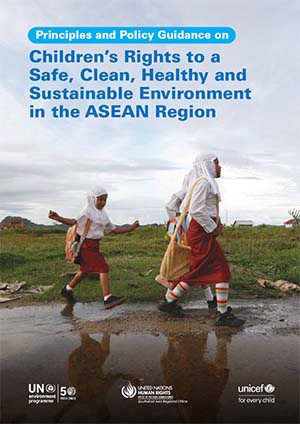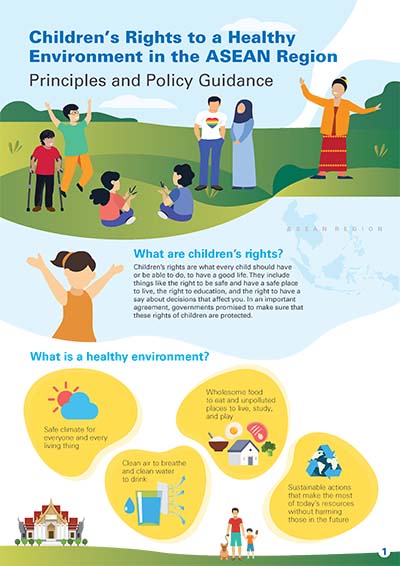Enhancing children’s rights to a safe climate, clean air and a healthy environment free from all types of pollution
 BANGKOK (23 November 2021) – The United Nations Environment Programme (UNEP), United Nations Children’s Fund (UNICEF), and United Nations Human Rights (OHCHR) are jointly launching today the Principles and Policy Guidance on Children’s Rights to a Safe, Clean, Healthy and Sustainable Environment in the Association of Southeast Asian Nations (ASEAN) Region.
BANGKOK (23 November 2021) – The United Nations Environment Programme (UNEP), United Nations Children’s Fund (UNICEF), and United Nations Human Rights (OHCHR) are jointly launching today the Principles and Policy Guidance on Children’s Rights to a Safe, Clean, Healthy and Sustainable Environment in the Association of Southeast Asian Nations (ASEAN) Region.
The Principles and Policy Guidance sets out fundamental principles for realizing children’s rights to a safe, clean, healthy and sustainable environment and for putting the best interests of children in the forefront. It provides essential policy guidance for governments, civil society, businesses, the media, and children to implement these principles.
“This groundbreaking initiative is the first of its kind, anywhere in the world, to provide guidance on advancing and protecting children’s rights to a healthy environment,” said Cynthia Veliko, the UN Human Rights South-East Asia Regional Representative in Bangkok.
“Ensuring these fundamental rights is not just a commitment to a healthier future for the world’s children, but to a more sustainable future for our planet and future generations. We hope the Principles and Policy Guidance will be used as a basis for an expanded ASEAN commitment to children’s rights to a healthy environment in the region,” Veliko said.
The Principles and Policy Guidance is the result of an 18-month collaboration among the three UN agencies and child, youth, and adult experts from around the ASEAN region. A child-friendly version of the Principles and Policy Guidance for children aged 14-18 years has also been developed.

Dechen Tsering, UNEP Regional Director and Representative for Asia and the Pacific, noted: “The Principles and Policy Guidance comes at a critical time as on the 8th of October this year, the United Nations Human Rights Council adopted a resolution that – for the first time in history – recognizes the human right to a clean, healthy and sustainable environment.”
“The right to a healthy environment is already recognized at the regional level within Article 28(f) of the ASEAN Human Rights Declaration, which states ‘Every person has the right to an adequate standard of living for himself or herself and his or her family including… the right to a safe, clean and sustainable environment,’” Tsering said. “Nevertheless, the Human Rights Council resolution elevates it to the international level. It formally places the right to a clean, healthy and sustainable environment alongside other universal human rights recognized under international law.”
The Principles and Policy Guidance will support the realization of children’s rights to a healthy environment across the region. This is vital as children, especially from vulnerable and marginalized backgrounds, are more exposed to and disproportionately impacted by environmental harm, despite being the least responsible for it.
“The climate crisis is a child rights crisis – for far too long children’s rights have been ignored in climate and environmental policies,” said Debora Comini, Regional Director, UNICEF East Asia and Pacific.
“The Principles and Policy Guidance will enable children to speak and participate meaningfully in climate and environmental actions in a safe space – while improving the accountability of states, businesses and other actors who are responsible for a healthy environment,” Comini said. “We cannot delay our actions any further – current and future generations need climate justice now.”
Almost every child on earth is exposed to at least one form of climate and environmental hazard, shock or stress, affecting their ability to realise the rights guaranteed to them. The climate crisis, pollution and biodiversity loss are threats that will transform childhood and jeopardize a sustainable future for children and future generations globally.
Children and youth are key agents of change in tackling the triple planetary crisis, which risks undoing decades of progress fighting for children’s basic rights. Earlier this month, at COP26 events focused on harnessing the expertise of young people, making their voices heard, and demanding the action needed to prevent catastrophic climate change in our lifetime.
Louise Mabulo, UNEP Young Champion of the Earth, a member of the Expert Group that developed the Principles and Policy Guidance, said: “I knew even then, as we were working on these sets of guidelines, that we were laying the groundwork and paving the way for better policies and frameworks for youth like me, and future generations of young people who will grow up in the environments that these guidelines could one day build. It is the future in the making, a series of brushstrokes that will paint the vision of the world as we hope for it to be one day.”
ENDS
For more information and media requests, please contact:
* UNICEF East Asia and Pacific: Shima Islam, Regional Communication Specialist, ssislam@unicef.org
* UN Environment Programme: Keisha Rukikaire, Head of News and Media, rukikaire@un.org
* UN Human Rights: Todd Pitman, todd.pitman@un.org, or Wannaporn Samutassadong, wannaporn.samutassadong@un.org
DOWNLOAD
Principles and Policy Guidance on Children’s Rights to a Safe, Clean, Healthy and Sustainable Environment in the ASEAN Region
English – Child-friendly version
Bahasa – Child-friendly version
Burmese – Child-friendly version
Cebuano – Child-friendly version
Filipino – Child-friendly version
